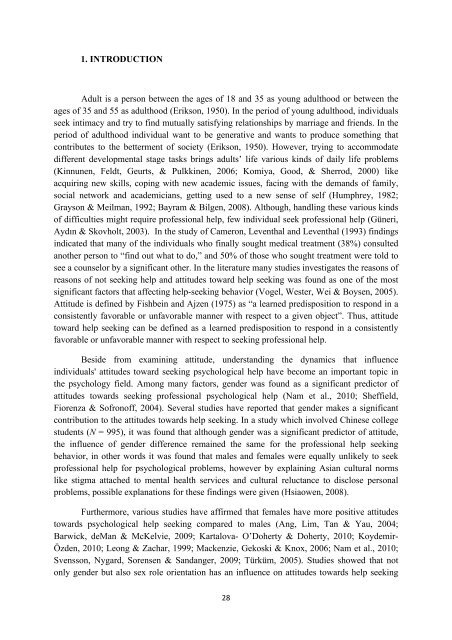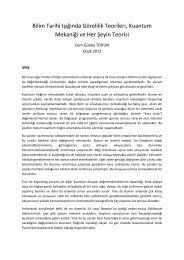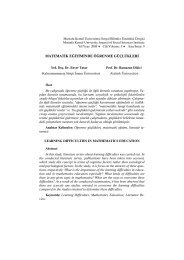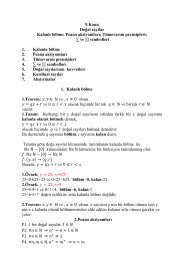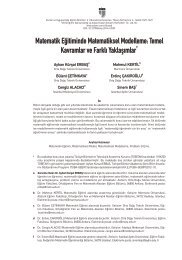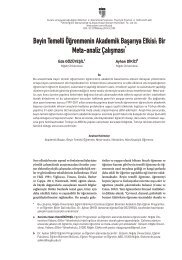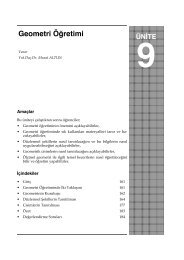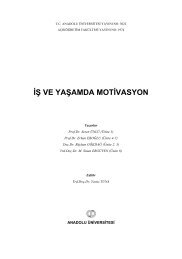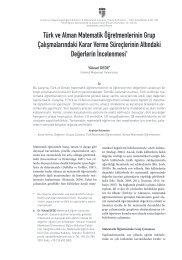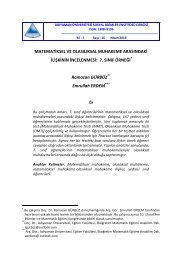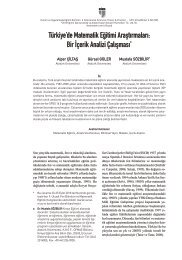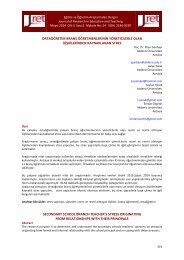1. INTRODUCTIONAdult is a person between the ages of 18 and 35 as young adulthood or between theages of 35 and 55 as adulthood (Erikson, 1950). In the period of young adulthood, individualsseek intimacy and try to find mutually satisfying relationships by marriage and friends. In theperiod of adulthood individual want to be generative and wants to produce something thatcontributes to the betterment of society (Erikson, 1950). However, trying to accommodatedifferent developmental stage tasks brings adults’ life various kinds of daily life problems(Kinnunen, Feldt, Geurts, & Pulkkinen, 2006; Komiya, Good, & Sherrod, 2000) likeacquiring new skills, coping with new academic issues, facing with the demands of family,social network and academicians, getting used to a new sense of self (Humphrey, 1982;Grayson & Meilman, 1992; Bayram & Bilgen, 2008). Although, handling these various kindsof difficulties might require professional help, few individual seek professional help (Güneri,Aydın & Skovholt, 2003). In the study of Cameron, Leventhal and Leventhal (1993) findingsindicated that many of the individuals who finally sought medical treatment (38%) consultedanother person to “find out what to do,” and 50% of those who sought treatment were told tosee a counselor by a significant other. In the literature many studies investigates the reasons ofreasons of not seeking help and attitudes toward help seeking was found as one of the mostsignificant factors that affecting help-seeking behavior (Vogel, Wester, Wei & Boysen, 2005).Attitude is defined by Fishbein and Ajzen (1975) as “a learned predisposition to respond in aconsistently favorable or unfavorable manner with respect to a given object”. Thus, attitudetoward help seeking can be defined as a learned predisposition to respond in a consistentlyfavorable or unfavorable manner with respect to seeking professional help.Beside from examining attitude, understanding the dynamics that influenceindividuals' attitudes toward seeking psychological help have become an important topic inthe psychology field. Among many factors, gender was found as a significant predictor ofattitudes towards seeking professional psychological help (Nam et al., 2010; Sheffield,Fiorenza & Sofronoff, 2004). Several studies have reported that gender makes a significantcontribution to the attitudes towards help seeking. In a study which involved Chinese collegestudents (N = 995), it was found that although gender was a significant predictor of attitude,the influence of gender difference remained the same for the professional help seekingbehavior, in other words it was found that males and females were equally unlikely to seekprofessional help for psychological problems, however by explaining Asian cultural normslike stigma attached to mental health services and cultural reluctance to disclose personalproblems, possible explanations for these findings were given (Hsiaowen, 2008).Furthermore, various studies have affirmed that females have more positive attitudestowards psychological help seeking compared to males (Ang, Lim, Tan & Yau, 2004;Barwick, deMan & McKelvie, 2009; Kartalova- O’Doherty & Doherty, 2010; Koydemir-Özden, 2010; Leong & Zachar, 1999; Mackenzie, Gekoski & Knox, 2006; Nam et al., 2010;Svensson, Nygard, Sorensen & Sandanger, 2009; Türküm, 2005). Studies showed that notonly gender but also sex role orientation has an influence on attitudes towards help seeking28
(Johnson 2001; Türküm, 2005). Johnson (2001) found that femininity has an influence on theconfidence of professionals’ abilities to help with psychological problems. In the study ofTürküm (2005), the positive help seeking attitudes of androgynous students who had bothfemininity and masculinity personality traits were found higher compared to both masculineand undefined students. In the same study the help seeking attitudes of feminine students werefound to be more positive than both masculine and undefined students.In a study done with 137 male college students from Midwestern University in theUnited States whose age range from 17 to 66 (Levant, Wimer, Williams, Smalley & Noronha,2009), it was found that the masculinity variables which are greater endorsement of traditionalmasculinity ideology, conformity to masculine norms, and a higher degree of gender roleconflict had an influence on attitudes towards seeking psychological help. In the same studymasculinity variables were associated with negative attitudes towards seeking psychologicalhelp.Ang et al. (2004) found different results compared to the other studies which confirmthe influence of sex role orientation on attitudes towards help seeking and they found thatmasculinity did not significantly affect help-seeking attitudes. Moreover, they found thatstudents with low femininity scores had less positive attitudes towards professional helpseekingthan students with high femininity scores, especially with regards to beingstigmatized and more sensitive about the opinions of others. Another study was conducted byJudd, Komiti and Jackson (2008) to understand why being female assisted help seekingbehavior. They found that women had higher rates on help-seeking for mental healthproblems than men. They also affirmed that this difference might be a reflection of genderrole differences. In the same study they have asserted that men’s social status, greater controland decision-making power may influence acceptance of a diagnosis of mental disorder andtheir difficulty in expressing feelings and emotions may influence their help seeking forpsychological problems (Amit, Brian, Murray & Jitender, 2009; Chan & Hayashi, 2010; Juddet al, 2008).The age difference was also found to be another factor that influences the help seekingbehavior (Shea & Yeh 2008). There are many contradictory findings about the effects of ageon help seeking attitudes. In the literature, whereas some studies have found that older peoplehave low intentions to seek help (Westerhof, Maessen, De Brujin & Smets, 2008) andnegative attitudes towards help seeking (Lebowitz & Niederehe, 1992), other studies haveconcluded that older individuals are associated with more positive attitudes toward helpseeking compared to younger individuals (Mackenzie et al, 2006; Svensson et al., 2009).In a cross national study, which was carried out with the participation of 262 Muslimwomen,it was found that younger participants, whose age range from 19 to 20, had lesspositive attitudes towards seeking professional help than older ones, whose age range from 21to more than 22. In the same study, researchers attributed this difference to insufficientknowledge about mental health problems and less awareness about the availability of mentalhealth services (Al-Krenawi, Graham, Dean, & Eltaiba, 2004). In a recent study, whichinvolved Turkish university students, it was reported that students between the ages of 24 and29
- Page 1 and 2: ISSN: 2146-7676UFUK ÜNİVERSİTES
- Page 3 and 4: UFUK ÜNİVERSİTESİSOSYAL BİLİM
- Page 5 and 6: SUNUŞDergimizin 2014 yılı ilk sa
- Page 7 and 8: A NEED-BASED EVALUATIONOF A PREPARA
- Page 9 and 10: In the literature on language teach
- Page 11 and 12: focus teaching on this. Accordingly
- Page 13: International Relations) were 20 (7
- Page 16 and 17: questionnaire in their English-medi
- Page 18 and 19: REFERENCESAlagözlü, N. K. (1984).
- Page 20 and 21: APPENDIX A1 STUDENT QUESTIONNAIRE
- Page 23 and 24: 24. Converting short notes into
- Page 27: The Role Of Gender On University St
- Page 31 and 32: Table 1 : Means and Standard Deviat
- Page 33 and 34: 2.3 ProcedureEthical permission to
- Page 35 and 36: age and attitude toward help seekin
- Page 37 and 38: Economics and Administrative Scienc
- Page 39 and 40: REFERENCESAddis, M. E., & Mahalik,
- Page 41 and 42: Koydemir-Özden, S. (2010). Self-as
- Page 43 and 44: LİSE ÖĞRENCİLERİNİN MESLEKİ
- Page 45 and 46: göre mesleki bakımdan daha önce
- Page 47 and 48: Araştırmanın amacıMesleki olgun
- Page 49 and 50: Tablo 1: Lise Öğrencilerinin Mesl
- Page 51 and 52: Lise öğrencilerinin karar verme s
- Page 53 and 54: KAYNAKÇA Acıbozlar, Ö. (2006). Y
- Page 55: Oğuz, Ö. (2008). Lise öğrencile
- Page 58 and 59: 1. IntroductionDifferent from the p
- Page 60 and 61: noteworthy to mention that multilin
- Page 62 and 63: The findings indicate that multilin
- Page 64 and 65: Table 1. Descriptives statistics fo
- Page 66 and 67: overall six factor structure which
- Page 68 and 69: wider variety of strategies with a
- Page 70 and 71: inclusion of instructors who are no
- Page 72 and 73: Gardner, R. C., & MacIntyre, P. D.
- Page 74 and 75: AppendicesAppendix A- English Profi
- Page 77 and 78: ELT Student Teachers’ Evaluations
- Page 79 and 80:
Reflective Teaching in TurkeyIn Tur
- Page 81 and 82:
Table 1: Reliability Analysis o
- Page 83 and 84:
Table 4: Mean and standard dev
- Page 85 and 86:
Table 9: Mean and standard dev
- Page 87 and 88:
ReferencesAkbari, R. (2007). Reflec
- Page 89:
Pollard, A. & Triggs, P. (1997) Ref
- Page 92 and 93:
1. GİRİŞEğitim ve program geli
- Page 94 and 95:
Genelgeçer tek bir bilimsel sürec
- Page 96 and 97:
Program geliştirmedeki yenilikleri
- Page 98 and 99:
-Elde ettiği sonuçlardan hareket
- Page 100 and 101:
“İnternet Üzerinden Öğrenme
- Page 102 and 103:
de sınıf içi dersler de öğrenm
- Page 104 and 105:
teknik ve pedagojik uzmanlar gerekt
- Page 106 and 107:
3. Proje ekibinin kurulması4. Plan
- Page 108 and 109:
KAYNAKÇABigdoli, H. (2004). The In
- Page 110 and 111:
110
- Page 112 and 113:
Hiçbir öğrenci bir diğeriyle ay
- Page 114 and 115:
İçerik sınıfta nelerin öğreti
- Page 116 and 117:
(MEB, 2006; Tomlinson, 2005). Ek ol
- Page 118 and 119:
- Öğrencilerden gereksinim duyduk
- Page 120 and 121:
desteklerine gereksinim duydukları
- Page 122 and 123:
KAYNAKÇAAlberto P. A, ve Troutman
- Page 124 and 125:
124
- Page 126 and 127:
1.GİRİŞBuradaki araştırma OECD
- Page 128 and 129:
öğretilenleri almışlar mı diye
- Page 130 and 131:
edileceğini araştırmaz, ancak bu
- Page 132 and 133:
yaşarlar: Çok fazla sayıda koşu
- Page 134 and 135:
• Birincil Stratejiler ve Destek
- Page 136 and 137:
ir dönemdir. Özellikle artan yaş
- Page 138 and 139:
2. Hipotez: Öğretmenlerin coğraf
- Page 140 and 141:
Tablo 7 Öğretmenlerin Coğrafi
- Page 142 and 143:
stratejileri”ne yönelik bilişse
- Page 144 and 145:
sonuçları χ 2 (12, N =407) = 13,
- Page 146 and 147:
sebebiyet verir. Bunun önemli bir
- Page 148 and 149:
KAYNAKÇAArtelt, C., Stanat, P., Sc
- Page 150 and 151:
Lieteratur. 10. Sonderheft: Lesesoz
- Page 152 and 153:
YAYIM ALANI, YAZIM KURALLARI ve YAZ
- Page 154:
• Birebir alımlar “…” İş


